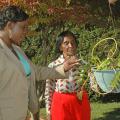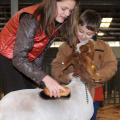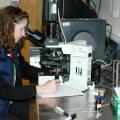Feature Story from 2010
MISSISSIPPI STATE -- Mississippi gardeners will have an opportunity to attend an exposition honoring plants and all things related to them at an event the first weekend in March.
The Everything Garden Expo will take place March 6 and 7 at the Mississippi Horse Park, located on Mississippi State University’s South Farm. Doors will be open from 8 a.m. until 6 p.m. on Saturday and from 11 a.m. until 5 p.m. on Sunday. Admission is $5, and children 6 and younger are admitted free.
By Patti Drapala
MSU Ag Communications
MISSISSIPPI STATE – Newton’s business and civic leaders have always expected a visit from Johnnie Mae Walker on behalf of the annual 4-H bike-a-thon for St. Jude Children’s Hospital, but they grew worried when other people appeared in her place.
MISSISSIPPI STATE – The Mississippi Agricultural and Forestry Experiment Station will hold a Farm and Industrial Equipment Auction Feb. 27 at the Mississippi Horse Park and Agricenter in Starkville.
The auction will begin at 10 a.m. and feature a wide range of surplus equipment being sold for Mississippi State University. The equipment and vehicles for auction include tractors, trackhoes, ditchers, skid steers, combines, cotton pickers, trailers and ATVs.
MISSISSIPPI STATE – The Southern Rural Development Center at Mississippi State University will administer a federally funded program that encourages new and innovative research on food and nutrition assistance issues.
By Patti Drapala
MSU Ag Communications
VICKSBURG – Crocheting may be a dying art to some people but not to Gloria Smith.
Smith is a 4-H volunteer leader in Warren County and has spent 50 years providing youth the direction they need to be successful in life. She began her lifelong journey by learning a skill that put her on a path to work with youth.
By Patti Drapala
MSU Ag Communications
MISSISSIPPI STATE – Diabetes can be difficult to manage in animals, but one Columbus family learned to master the task with help from Mississippi State University’s College of Veterinary Medicine.
MISSISSIPPI STATE – Mississippi’s forest industry is poised to take advantage of an old technology that turns sawmill residues into environmentally friendly energy sources for heat and electricity.
Wood pellets are made of the waste products of lumber production, and they can be burned for heat in homes and used to produce energy for industry. The knowledge and technology to make wood pellets have been around for centuries.
JACKSON -- The Dixie National Sale of Junior Champions is more than a place to highlight the state’s top market animals; it is a place to meet the next generation of champion youth.
Parents Connie and Allen Keene of Hattiesburg took part in livestock projects when they were teen-agers. Now, they are watching their children -- Alexandra Pittman, 12, and Carson Keene, 5 -- follow in their footsteps and beyond.
MISSISSIPPI STATE – Mississippi State University will help contractors wanting to continue their access to projects on certain buildings built before 1978 as an April training deadline approaches.
Contractors are required to be lead-certified by the Environmental Protection Agency by April 22 to perform projects that disturb lead-based paint in homes, apartments, child-care facilities and schools built before 1978.
By Rebekah Ray
Delta Research and Extension Center
STONEVILLE -- Black root rot, a fungal disease that infects cotton and soybeans, may be affecting more soybean acres across the Delta, and Mississippi State University researchers are working to prevent its impact.
MISSISSIPPI STATE – The plant disease diagnostic lab at Mississippi State University handled 726 samples in 2009, and nearly 100 of these were digital images rather than actual samples of diseased plants.
Clarissa Balbalian, diagnostician and lab manager with the MSU Extension Service, said the lab made reasonably confident diagnoses of 75 percent of these digital samples without requiring physical samples.
“That success rate is primarily due to the excellent quality of the photographs and the detailed descriptions that accompanied them,” Balbalian said.
MISSISSIPPI STATE – Many furniture manufacturers have indicated their desire for formal manager education and training within their organizations, and Mississippi State University has responded to this need by designing specialized training.
In the furniture industry, first-line supervisors are responsible for managing workers and coordinating all of the activities to make, ship, sell and deliver thousands of pieces of furniture, but there is little formal education and training available to them.
MISSISSIPPI STATE -- Those with a love for the outdoors have four conservation camps to take advantage of this summer offered through Mississippi State University’s College of Forest Resources.
Three of the camps are intergenerational and are geared for anyone interested in the outdoors. Designed for students 10 or older, the camps are useful for those who participate in the Envirothon or on Wildlife Habitat Evaluation Program teams. Students may attend individually or with parents and grandparents.
MISSISSIPPI STATE – Cotton production costs continue to climb in most categories with one exception – boll weevil control.
When the boll weevil eradication program first entered Mississippi’s eastern counties in 1997, cotton growers were assessed $20 per acre. As the program progressed westward, first-year assessments ranged from $20 to $24 per acre. Initially, weevils were also in the fields robbing growers of yields.
MISSISSIPPI STATE -- Parents should rely on dietitians’ and medical experts’ recommendations before attempting to alter formula that they prepare for their infant.
Brent Fountain, nutrition specialist with the Mississippi State University Extension Service, said newborn babies may need time for their bodies to adjust to nutrients consumed outside the womb. Most babies enter the world with natural abilities to know when they are hungry and to stop eating when they are full.
By Karen Templeton
MSU Ag Communications
MISSISSIPPI STATE – A Mississippi State University researcher has found that biology and computer science make the perfect combination for tracking animal flu viruses.
By Rebekah Ray
Delta Research and Extension Center
STONEVILLE -- Mississippi produces more than 60 percent of the nation’s pond-raised catfish, and Mississippi State University researchers in the Delta are working to keep the fish flavorful and safe to eat.
MSU’s College of Veterinary Medicine oversees the Aquatic Research and Diagnostic Laboratory at the Thad Cochran National Warmwater Aquaculture Center. The center is located at MSU’s Delta Research and Extension Center in Stoneville.
MISSISSIPPI STATE – Seven states with the country’s highest obesity rates are in the South, but this issue that causes health problems such as diabetes and heart conditions cannot be blamed simply on Southern roots.
A study by the Southern Rural Development Center headquartered at Mississippi State University found that simply living in a region does not lead to obesity. In “The South Does Not Make You Fat: A study of nutrition, food security and obesity,” researchers found that minorities and lower-income groups have higher obesity rates.
By Patti Drapala
MSU Ag Communications
WEST POINT – More than 60 years have passed since Clay County 4-H agent Elizabeth Miller chose young Norman Armstrong to lead Rally Day, and his participation in the organization that helps young people develop their potential is not yet over.
RALEIGH -- Poultry and cattle farmers will gain the latest production recommendations from state and national experts during educational seminars and a trade show set for April 8 in South Mississippi.
The Magnolia Beef and Poultry Expo will take place at the Smith County Agricultural Complex on Highway 35 South in Raleigh.
Pages
Feature Story Archive
- 2025 (64)
- 2024 (116)
- 2023 (114)
- 2022 (112)
- 2021 (104)
- 2020 (140)
- 2019 (126)
- 2018 (141)
- 2017 (197)
- 2016 (240)
- 2015 (319)
- 2014 (355)
- 2013 (371)
- 2012 (343)
- 2011 (246)
- 2010 (236)
- 2009 (229)
- 2008 (188)
- 2007 (210)
- 2006 (199)
- 2005 (224)
- 2004 (215)
- 2003 (228)
- 2002 (176)
- 2001 (184)
- 2000 (188)
- 1999 (180)
- 1998 (178)
- 1997 (188)
- 1996 (58)
- 1995 (36)










